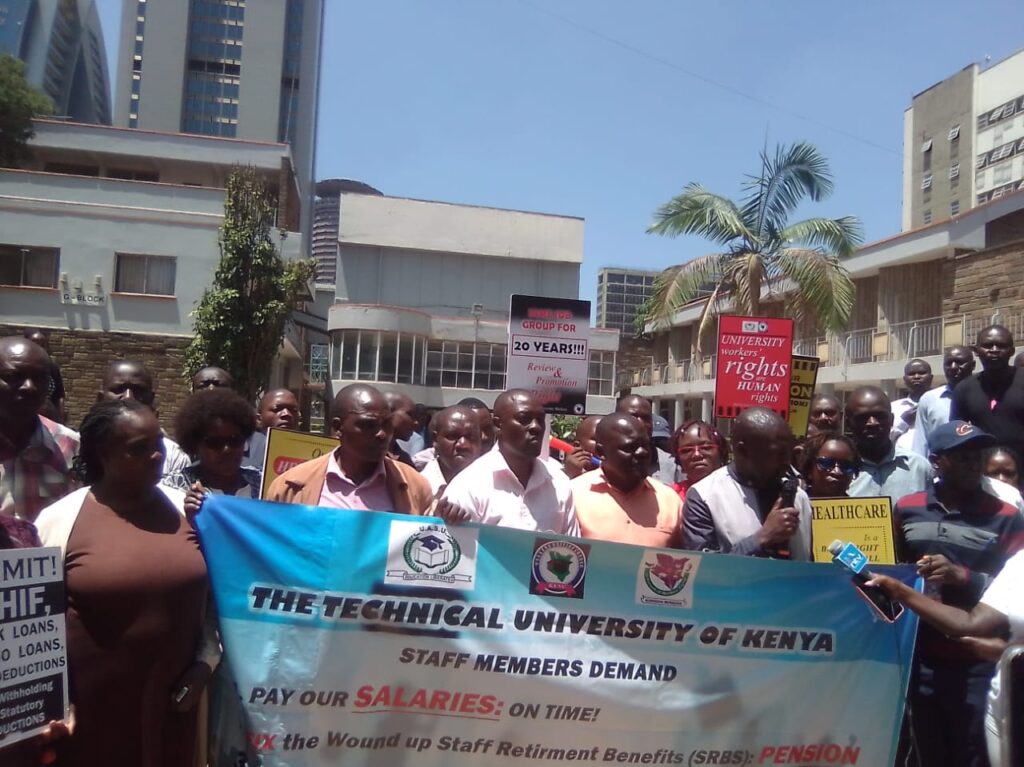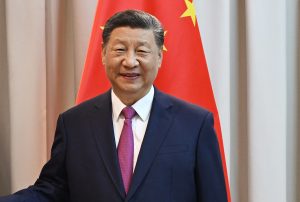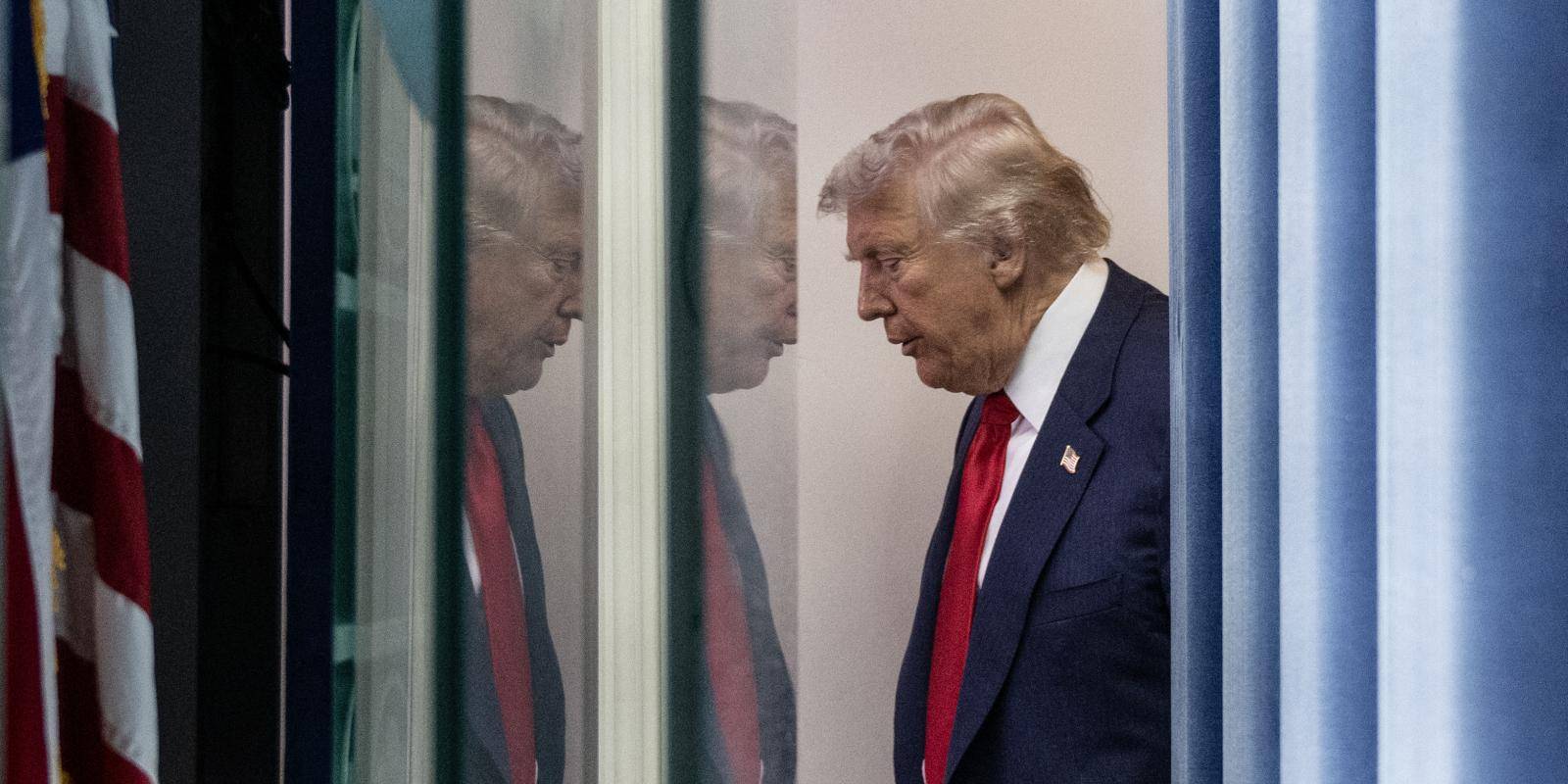Lecturers at Technical University of Kenya Protest Against Salary Deductions, Increased Taxes, and Poor Working Conditions

Lecturers at the Technical University of Kenya (TUK) held a demonstration today to protest against a series of issues that they claim have worsened their working conditions and financial well-being. The protest, which saw lecturers and academic staff gather outside the university administration building, was driven by concerns over government salary deductions, increased taxes, unpaid salaries, unremitted loans, and delayed pension payments. The protesters also expressed dissatisfaction with what they described as unfair management practices at the university.
The protesters were particularly vocal about the recent increase in taxes and government-imposed salary deductions, which many lecturers claim are inflated and unjustified. According to the lecturers, these deductions have severely impacted their income, with some stating that the tax burdens are now so high that they are unable to meet basic living expenses. The lecturers called for a comprehensive review of the tax policies, arguing that the increased taxes on public sector workers disproportionately affect educators who are already facing financial strain

“We are struggling to make ends meet due to the excessive deductions that have been made to our salaries,” said one of the lecturers during the protest. “On top of that, taxes are being increased, and it feels like the government is squeezing us dry without any consideration for our well-being.”
In addition to the financial deductions, the lecturers raised concerns over unpaid salaries and unremitted loans. Many of the academic staff have reported delays in salary payments, which have caused considerable hardship for themselves and their families. They also voiced frustration over loans that have not been remitted by the university, with some lecturers stating that they have faced penalties due to the non-payment of their loans.
“I have not received my full salary in months, and there are loan repayments that have not been remitted. This is affecting my financial stability and my ability to manage personal expenses,” another lecturer stated. “The lack of timely payments is not only unfair, but it’s also undermining the morale of the staff here.”
The lecturers also pointed to the issue of unpaid pensions, a longstanding concern that has added to the growing dissatisfaction among academic staff. Despite working for many years in public service, many lecturers have not received their pension payments, further deepening their financial woes. The delay in pension remittance has left many lecturers uncertain about their future security, particularly as they approach retirement.
The working conditions at the university were also a significant point of contention. The lecturers complained about inadequate facilities, a lack of necessary resources, and an overall lack of support from the university’s management. Many lecturers feel that their efforts to provide quality education are hindered by poor infrastructure and an unwillingness by management to address these issues.
“We are working in conditions that do not reflect the importance of education in this country,” one lecturer remarked. “The classrooms are overcrowded, resources are limited, and management is failing to address these issues, which makes it incredibly difficult to deliver the quality of education our students deserve.”
In addition to the financial issues, the lecturers also raised concerns about the lack of adequate healthcare coverage. They criticized the university’s medical insurance scheme, which they claimed fails to provide sufficient coverage for staff members. Many lecturers reported facing challenges accessing medical services due to the limitations of the health benefits provided.
The protest today also underscored the growing dissatisfaction with the university’s management. Lecturers described the management as unresponsive and disconnected from the daily realities faced by academic staff. They claimed that decisions are often made without consultation with the lecturers, and that their concerns are ignored or dismissed by those in leadership positions.
“There is a growing sense of frustration among the staff. Management seems to be making decisions in isolation without engaging the lecturers who are directly affected by those decisions,” said a member of the student union. “We need management to listen to us and work with us to improve the conditions here.”
The protestors are demanding that the government and university management take immediate action to address their concerns. They are calling for the full payment of salaries, the remittance of unpaid loans, the immediate payment of pensions, and a review of tax policies to ensure fairness for educators. Furthermore, they are requesting that management improve working conditions, increase support for academic staff, and enhance healthcare provisions.
As the protest concluded, the lecturers emphasized the importance of dialogue and negotiation. They are calling for a meeting with university management and government representatives to find solutions that will improve the working environment for lecturers and ensure their financial security.
The demonstration at TUK reflects broader challenges faced by academic staff at public universities across Kenya. With many lecturers facing similar issues, this protest may spark a wider conversation about the state of public sector education and the treatment of educators in the country.
It remains to be seen whether the protests will lead to concrete changes, but one thing is clear: the lecturers at the Technical University of Kenya are determined to continue their fight for better working conditions, fair pay, and improved management practices.





